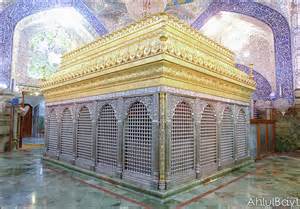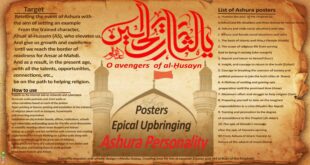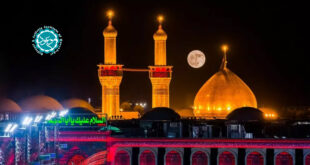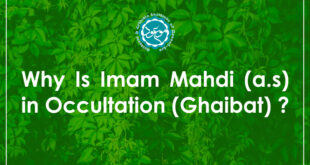Refusal of a life in disgrace, consent to the Red Death (the death of a martyr)
Indeed, Sayyid al-Shuhadā’ (‘a) chose to reject fealty and thus he chose death. He preferred death over life and the course of events proved that he made the correct choice since the heart-rending circumstances of his martyrdom, affirmed the persecution and righteousness of the Ahl al-Bayt. After his martyrdom, similar movements and bloodshed continued for twelve years.
After that, with the slight calm that transpired at the time of the fifth Imām (‘a), the Shī‘ahs came in torrents from all around to that same Household that no one paid attention to at the time of Sayyid al-Shuhadā’ (‘a).
Thus, day by day, the numbers of the Shī‘ahs of the Ahl al-Bayt increased and their rightfulness and brilliance began shining and glistering throughout the world. The basis for this was the Ahl al-Bayt’s legitimacy in tandem with their persecution, and the pioneer upon this field was Sayyid al-Shuhadā’ (‘a).
Now we wish to present a comparison of the conditions of the Prophet’s Household and their reception by the people in the Prophet’s day and the situation—which becomes more revitalized and more deep-rooted with every passing year—after Sayyid al-Shuhadā’s (‘a) martyrdom during these last fourteen centuries, making the verity of Sayyid al-Shuhadā’s (‘a) choice clearer than day. A poem recited by Sayyid al-Shuhadā’ (‘a)—according to some narrations—is an indicator of this same truth:
And it is not for us to feel fear, because our desires will be realized in the final government.
This is why in his last will and testament, Mu‘āwiyah greatly emphasized that if Husayn ibn ‘Alī refrained from swearing allegiance to Yazīd, Yazīd should leave him alone and not object.
Mu‘āwiyah did not make this final testament as a result of sincerity and love, rather he knew that Husayn ibn ‘Alī would not give his fealty and if he was killed by Yazīd, the Ahl al-Bayt would be marked by persecution which would be dangerous for the Umayyad dynasty and the best method of promotion and advancement for the Ahl al-Bayt.
The Imām indicates his duty
Sayyid al-Shuhadā’ (‘a) was aware of his divine duty which was refusal to swear fealty and knew better than anyone the limitless and unassailable power of Banī Umayyah and the character of Yazīd. He realized that an integral necessity of refraining to give fealty was his death and his divine duty necessitated martyrdom.
He explained this matter in various places with differing words. In the gathering of the governor of Medina who asked Sayyid al-Shuhadā’ (‘a) for his fealty to Yazīd, he said: “One such as me does not give fealty to a person like Yazīd.” During his nightly exit from Medina, he quoted his grandfather, the Holy Prophet (S), who said to him in a dream that God wanted—as a duty—that he dies. In an oration before he departed from Mecca, in answer to those who wanted to dissuade him from going towards Iraq, he repeated this.
On the way, in reply to an Arab personage who insisted that he desists from going to Kūfah or else he would surely die, the Imām declared:“This is not unknown to me. However, they will not leave me alone and will kill me regardless of where I am.”
Even though some of these narrations have contradictors or are weakly documented, regard and analysis of the prevailing conditions of the day completely substantiates them.
Variance of the Imām’s method throughout the rebellion
Of course, when we say the purpose of the Imām’s (‘a) rebellion was martyrdom and that God had asked for his martyrdom, we do not mean that God had asked him to first refrain from giving allegiance to Yazīd and then sit and notify the agents of Yazīd that they should kill him; thus, performing his duty in a nonsensical and irrational manner, naming it rebellion.
Rather, the Imām’s (‘a) duty was to rise up against the evil caliphate of Yazīd, deny him fealty, and carry out his dissent, which would end in his martyrdom, by any possible means.
This is why the Imām’s (‘a) method varied in line with prevailing conditions throughout his rebellion. First, when he was pressured by the governor of Medina, he began his nocturnal journey from Medina and sought refuge in Mecca—which was God’s sanctum and a religious haven—and stayed there for a few months.
In Mecca he was under the covert surveillance of the caliph’s intelligence officers until it was decided that he be killed or captured at the time of hajj and be sent to Shām. On the other hand, a deluge of letters was coming in from Iraq for the Imām (‘a). Thousands of letters promised him support and aid, inviting him to Iraq.
In the final letter from the people of Kūfah, which—according to some historians—was clearly sent to finalize their vows, the Imām decided to initiate his blood-filled campaign and rebellion. First, though, he sent Muslim ibn ‘Aqīl as his representative to guarantee the truth of their pledge. After a while, Muslim sent a letter explaining the favorable conditions for the Imām’s uprising.
In view of these two factors, i.e. preserving the sanctity of the House of God from the secret officers of Shām who had come with the intent of either killing or capturing the Imām (‘a) and the apparent readiness of Iraq for rebellion, he set out for Kūfah.
Then, in the middle of the way, when he received news of the horrible assassination of Muslim ibn ‘Aqīl and Hānī, he altered his method from an offensive uprising and war to a defensive rebellion. He filtered and purified his assembly, keeping only those who would aid him to their last drop of blood, and proceeded towards the site of his martyrdom.
Question: What is the nature and extent of the knowledge of Imām (‘a)? Does the Imām have knowledge of the details of his death, even the exact time?
Answer: According to many narrations, the Imāms (‘a) have attained such proximity to God that they can know by the will of God whatever they wish to know. This includes thoroughly detailed knowledge of their deaths and martyrdoms. There are no rational grounds to repudiate this matter and there are also narrations saying that each Imām holds a ‘Tablet from God’ in which their specific duties are recorded. Still, they are obligated to preserve the appearance of normal life.
Here an answer to a certain criticism is made clear, that advancing towards certain danger is not logical. Reason demands that a person never does something that they know entails definite danger, especially mortal danger.
Hence, how can one believe that the Imāms (‘a), who are the wisest among the wise, will do something that they know will end in their deaths? Essentially, no person willfully does something that he definitely knows is dangerous. In addition, how can an Imām satisfy himself to voluntarily cause his own death whereby divesting the human world of the blessings of his existence?
Answer: The unreasonableness of performing a voluntary act entailing certain danger is because usually people do everything for their own good and therefore, they do not do something that would entail their extermination. However, if one determines that the deed is more important than preserving their own life, they will surely carry it out without fearing their own death. In substantiation, hundreds of examples may be found in various movements and revolutions. A living proof of this is the incident of Karbalā;the Husaynī movement.

 Mouood Mouood English Edition
Mouood Mouood English Edition



